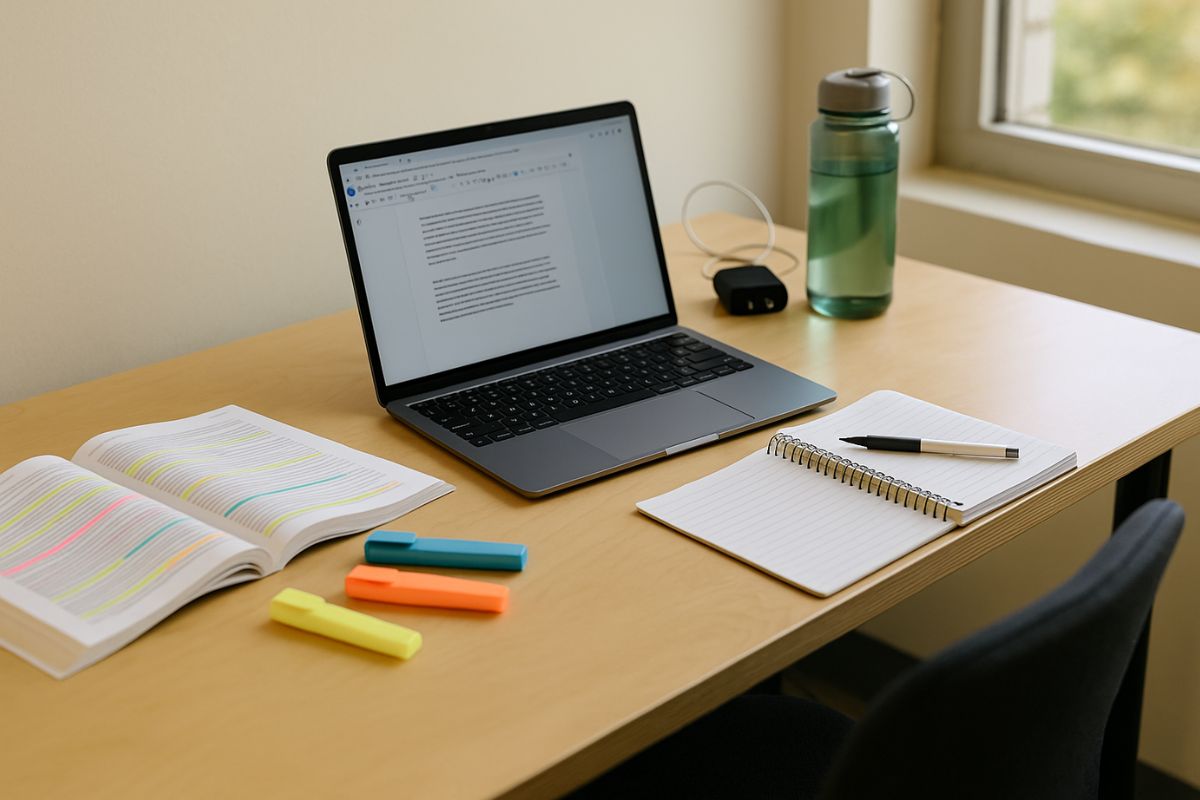Right, I’m going to tell you about the night I nearly had a proper breakdown over my coursework due to the lack of a proper, productive study routine.
It was 2am on a Tuesday. I’d been sat at my kitchen table for eight hours straight, surrounded by empty Pot Noodle containers and about fifteen different highlighters. My eyes were stinging from staring at my laptop screen, and I was reading the same bloody paragraph about photosynthesis for the sixth time.
Nothing was going in. Absolutely nothing.
It was at that point I knew I was being a total muppet. I kept lying to myself that I just needed to work harder. Longer hours. More coffee. Less sleep. Turns out, absolute nonsense. It was all or nothing, and what I was doing was not it. Having an effective study routine at home is not about torturing yourself to death until your brain is burnt out. It’s about being clever with your time and space.
Sort Your Space Out First
Most people start planning their study timetable. Wrong move.
Your environment matters more than anything else. I used to sprawl across my bed with Netflix on in the background. Brilliant idea, right? Obviously I kept nodding off or getting distracted by whatever was on.
Pick one spot in your house. Doesn’t matter if it’s tiny. Just make it yours. Your brain needs to know that when you sit there, it’s work time.
I cleared out a corner of my bedroom. Got a proper desk from a charity shop for fifteen quid. Best money I ever spent. Now when I sit there, my brain automatically switches gear.
Make it comfortable but not too comfortable. Sofas are the enemy. You need a chair that keeps you awake. Good lighting too; squinting gives you headaches faster than you can say “essay deadline”.
Keep everything within reach. Pens, paper, phone charger, water bottle. Having to get up to find a working biro kills your momentum dead.
When Your Brain Actually Works
Here’s something nobody mentions: we’re all different. Some people are morning larks. Others are night owls. I’m useless after 7pm but absolutely on fire between 10am and 2pm.
Figure out when you think best. Then protect those hours like they’re made of gold.
I tried all sorts of timing methods. The Pomodoro thing (25 minutes on, 5 off) made me feel rushed. Now I do 45 minutes, then a proper 15-minute break. Works much better.
Whatever you pick, stick to it. When the timer goes, stop. Don’t think “just another five minutes”. That way lies madness.
Tell People To Leave You Alone
Living at home means everyone thinks you’re available all the time. Mum wants you to help with shopping. Your little brother needs help with his Xbox. The dog wants feeding.
Put your foot down. Tell everyone when you’re studying. Put a sign up. Lock your door if you have to.
Turn your phone off. Properly off, not just silent. That text about tonight’s plans can wait an hour. Instagram will cope without you.
Routine, Not Prison
People create these mental timetables and then beat themselves up when life gets in the way.
Study at roughly the same times each day, but don’t be rigid about it. If you normally start at 9am but you’ve got a dentist appointment, just shift everything along. Don’t write the whole day off.
I always make tea before I start. Always tidy my desk when I finish. These little habits tell my brain what’s happening next.
The “Explain It To Someone Thick” Method
If you can’t explain something simply, you don’t get it yet. That’s the truth.
I explain stuff to my dog. Seriously. Buster’s heard me go through everything from the French Revolution to quadratic equations. He’s not much cop at feedback, but he’s a good listener.
Try recording yourself explaining things. Play it back while you’re making dinner. You’ll remember loads more than you think.
Technology: Helpful Or Horrible?
Apps can be brilliant, or they can be a massive time-waster. Don’t spend hours looking for the perfect productivity app when you should be studying.
I use three things: a timer, a notes app, and something that blocks Facebook. That’s it.
The internet’s amazing for research but deadly for concentration. Set specific times for looking things up. Don’t let yourself disappear down YouTube rabbit holes about something completely random.
Look After Yourself (Boring But Important)
You can’t think properly if you’re knackered, hungry, or dehydrated. Basic stuff, but people ignore it.
Sleep enough. Eight hours if you can manage it. I know it’s tempting to stay up late, but tired brains are useless brains.
Eat proper food. Not just crisps and energy drinks. Your brain needs fuel that actually works. I keep fruit and nuts on my desk.
Move around between study sessions. I do star jumps in my room. Sounds daft, but it wakes me up better than coffee.
Keep Track Of What Works
For one week, write down when you studied, how long for, and whether it went well or terribly.
You’ll spot patterns. Maybe you’re rubbish on Monday mornings. Perhaps you work better with music on. Or you might discover that studying after dinner makes you sleepy.
Use this information to build your productive study routine at home. What works for your mates might be awful for you. That’s fine.
When Everything Goes Wrong
Some days you’ll sit down with good intentions and achieve absolutely nothing. Your brain will feel like cotton wool. Every word will seem impossible.
This happens to everyone. Even people who look like they’ve got their lives sorted.
Don’t give up. Don’t decide you’re hopeless. Just try again tomorrow. We need to remember that success is not simply a case of successful people never having a bad day, not allowing one bad day to ruin everything else.
Making It Actually Stick
Building a decent routine takes proper time management. Give yourself a month, minimum. The first week feels forced and unnatural. The second week feels slightly easier. By the fourth week, it should feel automatic.
Be patient. Changing habits is hard work, especially if you’ve been doing things wrong for ages. But once you crack this, studying becomes so much easier. You might even start looking forward to it instead of dreading it.
Your future self will be properly grateful you sorted this out now. Trust me on that one.






